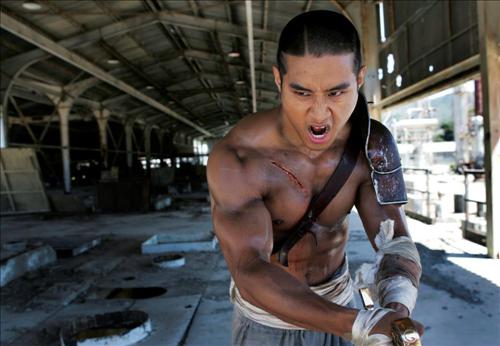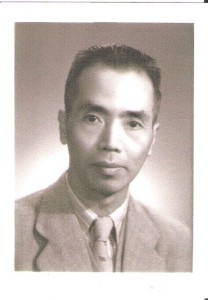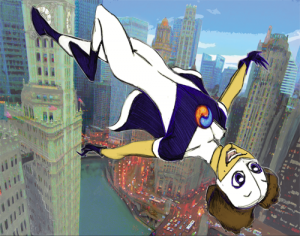I first met Amber Belldene in person in the Starbucks in the Marriott at RWA 2013. We’d exchanged a few tweets, and I’d always found her funny and sympathetic. In person, I liked her right away — she has a great smile and she’s easy to talk to. It would have been the perfect moment for a getting-to-know-you-cup-of coffee, but she was running to a session, so we didn’t have time.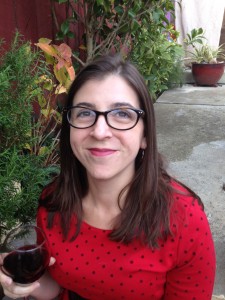
Nevertheless, in the course of those seven short minutes, I learned that she was an Episcopal priest, that she wrote paranormal and contemporary romance, and that she was doing a session on God and Sex at RT 2014, and I somehow managed to confess all sorts of things to her about the weird mishmash of influences that have made me who I am spiritually.
Based on that alone, I knew I had to corner her at first opportunity for the missed cup of coffee — but it actually turned out to be a glass of wine. I was visiting San Francisco with my family, and she and I hung out at a wine bar and had one of those wide-ranging conversations you have with someone you probably knew in another life.
We had such a good time, we decided to spin some of our conversation off into a Wonkopost, in the hopes that we could get some of you to join in as well. We had to narrow things down a bit, so we chose “spirituality and the work of writing” as our territory for this post. To start, we posed four questions to ourselves:
Why do we write?
How does spirituality enter into writing?
What are our writing “demons” and how do we conquer them?
What is the connection between spirituality and individual voice?
Why do we write?
Amber: Like a lot of writers, the need to put words on the page is pretty compulsive for me. It’s a creative outlet, a place to put energy that can get rather destructive if doesn’t have somewhere else to go. So partly, the vocation to write seems to come from the way I’m wired.
But the other side of that coin is what I believe about how humans are wired. I’m from a liberal Christian denomination and I interpret the Bible as primarily a religious document. I believe the stories are not and never were intended to report history, but instead to use narrative to convey a transcendent truth because narrative is the best way to convey Truth with a capital T.
I spend a lot of time in my priestly work trying to teach that concept, or to simulate it in my preaching, and it gives me a sense of the sacred about the work of the writer, both mine and others. I don’t aspire to write something of profound religious significance, but every ordinary human story told in a solid genre fiction book can also be a vehicle for the transcendent. In fact, I especially believe romantic and erotic stories are well suited to convey transcendence. Even if only one paragraph gets there, or only a few readers find that in a story, it feels like a worthy endeavor to me. And I never feel my effort is wasted, because I simply have to do it to stay sane.
Serena: Writing is a compulsion for me, too. As a kid I used to strongly identify with the Frost quote from Two Tramps in Mud Time (re-popularized for certain avid readers by Madeleine L’Engle in The Arm of the Starfish):
But yield who will to their separation,
My object in living is to unite
My avocation and my vocation
As my two eyes make one in sight (check)
Only where love and need are one,
And the work is play for mortal stakes,
Is the deed ever really done
For Heaven and the future’s sakes.
The first time I read that, when I was twelve or so, I knew it had something to do with me and the way I felt about writing. I knew I was supposed to write and that somehow, I was supposed to do it as my job.
Later I heard Christian friends using the term “called,” and recognized that that particular word succinctly expressed how I felt—that something, somewhere out there or deeply inside me—exhorted me to write.
How does spirituality enter into writing?
Serena: Some people talk about their muse or the little man in the basement who gives them ideas, but I’ve always felt like I was channeling some power that was bigger (and better) than me.
In order for that channeling to work, I have to give up control and let the other power talk (usually by just putting my fingers on the keyboard—although lately Dragon Dictate works pretty well, too :-)). But letting go is key. That’s the only way to achieve that flow state where, if I look back at what I’ve written afterwards, I don’t actually remember writing it, as if someone else did it when I wasn’t looking.
The first draft is usually my best opportunity to commune with whatever that higher power is. By the time I get to the revision state, I’m pretty earthbound and most of what I do has to do with fixing things in a very concrete way. But there are still flashes of that “channeling,” even at that stage, when I rewrite long passages, or write new scenes, or generally open myself to inspiration.
One area where I only very rarely have a sense of being inspired from the outside (or the deep inside) is the generation of structural ideas in the work—like premises or plot lines or even whole characters or scenes. For me, inventing these *pieces* is very human work. But then when I put words to the pieces—actually type the scene, bring a character to life, turn a premise into a synopsis or a blurb—the higher power seems to be at work again.
Amber: I love hearing about this process, and I’m sure it will be interesting to know the next time I read something you wrote. In Hold On Tight, I definitely think you were channeling a higher power. Especially in those sex scenes!
Much like in the rest of my life, I find God in my writing when I talk about it with others—when my critique partners notice something I didn’t, or that I really, really hoped they would. When they ask me just the right questions, or point out something enormous that I completely missed. When an observation I have about their story is helpful. Serena is especially good at circling around with me to tell me when feedback I gave her was helpful, which is a lovely trait in a CP (and makes me enormously glad that we met in that Starbucks line last summer!) I find this kind of collaborative partnership incredibly generative. It feels holy, it makes my work feel holy.
Also, as someone steeped in Biblical themes and imagery, I love it when my subconscious is clearly working in the story, has made things happen and drawn connections I wasn’t aware of until after I wrote them, or when an unexpected things comes together because of groundwork I laid in the story unconsciously or experimentally. Here is a totally embarrassing example. My paranormal series is about vampires who make wine, and a particular wine they can drink instead of blood. You probably get the idea—wine, blood, Jesus. All my priest friends nodded as if this was the most obvious story a paranormal-romance-writer-slash-priest could think of, but honestly, I got there in a completely round about way, through vampire mythology and Homer.
Maybe this is the collective unconscious or the monomyth at work, maybe it’s the Holy Spirit (which is what I think of when my writer friends talk about their muses), but it’s really, really fun, and surprising, and awesome, in the literal sense of the word, to feel like you’ve somehow tapped into a vein of THE GREAT STORY (sorry, again with the blood imagery) when you’re writing. It’s addictive!
What are our writing “demons” and how do we conquer them?
Serena: The going definitely gets rough in writing. When Amber and I had our wine bar get-together, we talked about the fact that for us—and, we suspect, most writers, the writing itself is not the hard part, not the work. Instead, the hard part of being a writer is not succumbing to all the emotional pitfalls of the job.
On any given day, there are a lot of things trying to tug you away from what matters—the writing—and toward a number of negative emotions, like the kind of despair you feel when something gets rejected, or the panic you feel when a revision letter blindsides you in some way. These emotions are strong and plentiful—they surprise you and try to get a foothold, and the work is setting them aside and coming back over and over again to the writing.
My worst enemy is the feeling that someone else is doing something I’m not. Sometimes that’s a success—new contract, new series, bestseller—but often, it’s just something fun like a conference, workshop, or retreat, or brilliant promo idea that I wish I’d thought of. And on my worst days, I admit, sometimes it’s just the fact that two people I really like and admire are having a really interesting conversation about something I never bothered to think about.
Actually, this is really just another way of saying that my worst enemy is ME, feeling like I’m not doing enough, somehow. It doesn’t bother me all the time, or even most of the time, but when it happens, it’s hard to pull my focus back to what I *am* doing.
Pulling my focus back to what I am doing is hugely a matter of remembering that I’m writing because I’ve been given this strange pairing of talent and love. The fact that I’m lucky enough to have both calls upon me (often in a very demanding way) to give everything I can to writing. And the most demanding part is making myself write when everything conspires against it. Which means that every time I turn away from the demons—however they manifest themselves, in whatever distracting form—and back towards the words, I’m doing spiritual work.
Amber: Serena, I like the way you’ve identified that insecurity about “doing enough.” I have a bad case of that too—a fear that I’m not moving fast enough, that if I don’t keep making progress, my career will stagnate and also that compulsive need to write more than my life actually allows for. And yes, so many outside things can trigger that feeling, but it’s roots are definitely in me.
One of my demons is my rivalrous lizard brain. That’s my deep instinct to become afraid and jealous at someone else’s success. My more evolved self is passionately convinced that success is not scarce, that one person’s win also elevates the whole, and that it in no way reflects on my own skill or potential. In college I became a fan of the social philosopher Rene Girard, and his theories on rivalry and violence—how wanting what someone else has is a foundational human trait, which he ties to the roots of societal violence. I do think we can train ourselves out of these reactions, and for me that means focusing on abundance when things feel scarce, seeking reassurance from a trusted friend when I doubt myself. All that helps me a lot.
My second demon is the need to feel smart, which has deep roots in the ol’ “family of origin stuff” as we say in seminary. Ironic that I would chose to write in a genre that is itself rather embattled around its intellectual legitimacy, right?
This demon tempts me to get into the meta critical conversations on Twitter, certain smart review sites, and even here on the fabulous Wonkomance. To do it right, to say what I feel is important to say, with as much nuance and passion as I feel, and then to follow the other comments, takes so much time that I simply don’t have as a full-time priest, parent of toddler twins, spouse, and person with the compulsive need to write. When I do weigh in, I fret about whether my point will be understood, wish I could retract or edit, watch replies when I need to be doing other things, and find myself irrationally anxious to the point I basically have had to force myself not to engage at all, like so many of us have chose to ignore the genre-bashing click bait lately. In other words, it’s like a spiritual discipline to stop trying to work out my daddy issues by proving I’m smart to you all :-)
What is the connection between spirituality and voice?
Amber: When I was first ordained, I compared myself to other priests who were great at the pastoral stuff (what do you say to the new widow, etc) or the great administrators, fundraisers, preachers. I was constantly thinking about trying to be as good as them at all those things, and somewhere along the way, as I grew comfortable with my own gifts, which were distinct, and sometimes overlapped with my mentors’ and sometimes didn’t, I started to realize my job wasn’t to be as good as them, but to be as good at possible at being myself, using my own gifts.
Now, as I writer, I found myself returning to this lesson often, especially when I read a really great book, or learn of someone else’s success. What I uniquely bring to a story is my world view—how I see life and the human condition. And on top of that, how I use language to draw people into that worldview (voice). On a bad day, I try to tell myself I just need to keep working on doing those things the very best I can. That’s having integrity as an author, and trusting that the right readers will find me eventually. It doesn’t mean I can’t be strategic about what I write.
Serena: Gah, Amber, I love what you said about not comparing and being comfortable with one’s own gifts. I might have to write it on an index card and stick it up somewhere.
During those moments when I’m most effectively letting go and “channeling,” I also find that my “voice” comes through in spades. If I’m forcing it, if I’m over-writing because I want to achieve something or accomplish something, because I want to please someone else or be something else, my voice doesn’t shine. When I force, the process feels klugy and the result is less than ideal.
That doesn’t mean I can’t respond to editorial suggestion—not at all. It just means have to find a way to separate education from inspiration. I can educate myself as much as I want—take advice from beta readers and critique partners, read writing craft books, listen to wise editors, etc. But when I create, I have to get out of my learning brain and into my channeling brain, and I have to criticize myself as little as possible so I can put all my attention into listening.
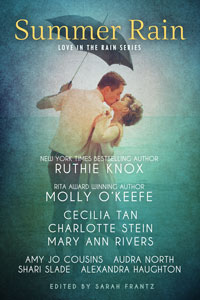 But before I jump into that, I want to shamelessly plug a romance anthology that came out on Monday that myself and a few other Wonksters, plus some friends of Wonk, are in. It’s called Summer Rain, it has nine exclusive romance stories in it, and all author proceeds from the sale of the volume go to benefit the Rape Abuse, and Incest National Network (RAINN)!
But before I jump into that, I want to shamelessly plug a romance anthology that came out on Monday that myself and a few other Wonksters, plus some friends of Wonk, are in. It’s called Summer Rain, it has nine exclusive romance stories in it, and all author proceeds from the sale of the volume go to benefit the Rape Abuse, and Incest National Network (RAINN)! Or Exhibit B: Yoon Seung-jun, super mega Korean hotness:
Or Exhibit B: Yoon Seung-jun, super mega Korean hotness: